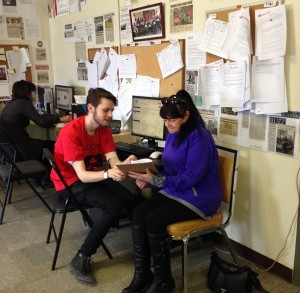Building better ladders for education and social mobility
Recently, experts from the Center on Assets, Education, and Inclusion at the University of Kansas, the University of Michigan, and Pew Charitable Trusts gathered to discuss education and social mobility. With economic anxieties prominent in the presidential election, questions about the viability of the American Dream, and headlines decrying the end of college as a path to prosperity, there has perhaps never been a better time to examine the ladders that are supposed to facilitate children’s pursuit of opportunity and the policy failures that have pulled out the rungs.
Mobility can refer to one’s chances of moving up in comparison to peers; this is relative mobility, and evidence of stickiness at the extremes of the economic distribution—where those at the top seldom fall far and those at the bottom struggle to climb—is particularly urgent given the chasm that separates the haves from the have nots. The academic gap that widens each summer, erosion of need-based financial aid, and inequity in educational preparation leave few chances for talented but poor children to study their way out of poverty. Instead, privileged parents use education to insure their children against failure, with the result that education serves as much to reproduce inequity as to catalyze opportunity.
The landscape of absolute mobility is less dire but still bleak. While 84% of Americans have higher incomes than their parents, just 50% exceed their parents’ wealth and fewer than 30% of Americans think their children will be better off than they are. Burdened by student debt, compromised in their efforts to build social networks and leverage their degrees, and hindered without an asset foundation from which to finance risks, students who grow up poor and graduates of color benefit less from their degrees, as demonstrated in new research highlighted by AEDI’s Dr. William Elliott.
But all is not lost; indeed, demonstrated hunger for a robust educational system as a foundation of equitable mobility provides hope that we may be at a turning point. As the event underscored, investing in neighborhoods, equalizing education funding, and equipping children with a capital base in the form of a reimagined, asset-based financial aid system could redeem the promise of economic ascent, cushion families through uncertainty, and ensure that effort—not starting position—primarily determines ultimate outcomes. By making different choices, we can #buildbetterladders. Such is the task we face.
Written by Melinda Lewis, Assistant Director, Center on Assets, Education, and Inclusion (AEDI).
Watch the recording of the event:
 ACORN Canada is a grassroots organization that spends a big chunk of our resources going door-to-door talking to families about their biggest issues. We have recently integrated Canada Learning Bond outreach into our day-to-day activities. Each office talks to between 30-130 low-income families every day. We have
ACORN Canada is a grassroots organization that spends a big chunk of our resources going door-to-door talking to families about their biggest issues. We have recently integrated Canada Learning Bond outreach into our day-to-day activities. Each office talks to between 30-130 low-income families every day. We have